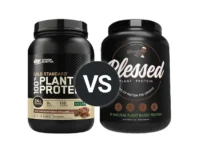Knowledge BaseYou're Questions Answered
What does protein powder do after a workout?
Consuming protein powder after a workout serves several important functions for recovery, muscle repair, and growth. Here’s what protein powder does for you post-exercise:
1. Supports Muscle Repair and Growth: During exercise, especially strength training, muscle fibers experience micro-tears. Protein provides the essential amino acids needed to repair these tears and promote muscle growth. Whey protein, in particular, is rich in a key amino acid called leucine, which is critical for initiating protein synthesis1.
2. Reduces Muscle Soreness: Protein intake after a workout can help alleviate muscle soreness by accelerating repair processes and reducing inflammation. This is crucial for maintaining regular training schedules without extended downtime due to soreness2.
3. Enhances Recovery: Quick absorption of protein, such as that found in whey protein powders, helps replenish the body’s energy stores and repair muscles more rapidly. This quicker recovery allows for more frequent and effective training sessions3.
4. Helps Maintain and Increase Muscle Mass: Regular protein supplementation post-workout can help prevent muscle loss, especially during weight loss or cutting phases, and supports muscle hypertrophy for increased strength and size4.
For optimal results, it is recommended to consume protein within a 30-minute to two-hour window after your workout. This timeframe, often referred to as the "anabolic window," is believed to be the ideal period for getting the most benefit from protein in terms of muscle recovery and growth5.
- Churchward-Venne, T. A., Murphy, C. H., Longland, T. M., & Phillips, S. M. (2013). Role of protein and amino acids in promoting lean mass accretion with resistance exercise and attenuating lean mass loss during energy deficit in humans. Amino Acids, 45(2), 231-240.
- Jackman, S. R., Witard, O. C., Jeukendrup, A. E., & Tipton, K. D. (2010). Branched-chain amino acid ingestion can ameliorate soreness from eccentric exercise. Medicine & Science in Sports & Exercise, 42(5), 962-970.
- Phillips, S. M. (2014). A brief review of critical processes in exercise-induced muscular hypertrophy. Sports Medicine, 44(S1), S71-S77.
- Moore, D. R., Robinson, M. J., Fry, J. L., Tang, J. E., Glover, E. I., Wilkinson, S. B., ... & Phillips, S. M. (2009). Ingested protein dose response of muscle and albumin protein synthesis after resistance exercise in young men. The American Journal of Clinical Nutrition, 89(1), 161-168.
- Ivy, J. L. (2004). Timing of amino acid-carbohydrate ingestion alters anabolic response of muscle to resistance exercise. The American Journal of Physiology-Endocrinology and Metabolism, 281(2), E197-E206.
Related Questions
Related Reviews

Your Answer
We are a participant in the Amazon Services LLC Associates Program, an affiliate advertising program designed to provide a means for us to earn fees by linking to Amazon.com and affiliated sites.


